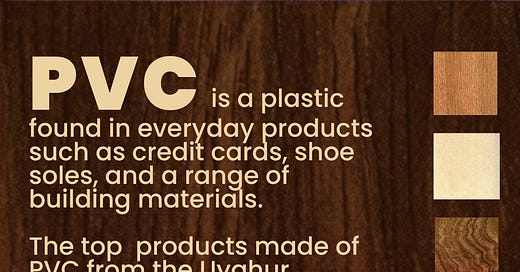Breaking News: Biden Administration Moves Against Imported PVC Flooring
CBP targets products tied to forced labor in Uyghur Region, follows “Made in U.S.A.” directive
U.S. Customs and Border Protection (CBP) is cracking down on imports of polyvinyl chloride (PVC, vinyl) plastic flooring, according to new reporting by trade law experts. This action is a direct result of last year’s joint investigation by Sheffield Hallam University’s Helena Kennedy Centre for International Justice (HKC), Material Research L3C, and The Intercept. Customs followed the trail blazed in these reports, which tied much of the flooring sold in the U.S. to factories that participate in forced labor programs and that are among the world’s biggest polluters.
According an article published today by the law firm, Sandler, Travis & Rosenberg, P.A., “CBP is now detaining PVC products such as vinyl flooring under the Uyghur Forced Labor Prevention Act (UFPLA) and asking importers to trace these items back to their originating chemicals such as chlorine, carbon, and ethylene.” HKTDC Research of Hong Kong repeats this reporting.
On June 14, 2022, Sheffield Hallam’s Helena Kennedy Center published Built on Repression: PVC Building Materials’ Reliance on Labor and Environmental Abuses in the Uyghur Region. The same day, The Intercept published Mara Hvistendahl’s exposé, How Vinyl Flooring Made With Forced Labor Ends Up at Big Box Stores. Also last June, CBP began enforcing the UFLPA, but PVC was not yet in their scope.
Since then, parties in the supply chain have tried to cover their tracks. “The obscuring of Uyghur Region PVC only seems to have gotten worse. They’re making it harder for researchers, companies, and law enforcement to trace,” said Professor Laura Murphy, co-author of Built on Repression and a world leading expert on marketplace connections to forced labor. “So the fact that CBP is compelling companies to trace their supply chains is critical.”
For the past year, Built on Repression’s authors have pressed the agency and architects and designers to put a halt to these imports.
“Green building practitioners know better, but instead they keep greenwashing the images of companies that are connected to the repression of people who are suffering genocide,” said co-author Nyrola Elimä, an advisor to Material Research. “An easy way to support justice for the Uyghur people is to stop buying PVC flooring.”
“The green building movement has been notably silent since we exposed this supply chain last June,” said Jim Vallette, president of Material Research. “Awash in flooring industry influence, architects, designers, building owners, and big box stores continue to purchase imported PVC flooring.”
According to Material Research, flooring companies named in the report reinforced their market position by sponsoring initiatives such as a “Design for Equity Primer” published by Metropolis in December. In return, the beneficiaries praised their sponsors’ so-called “deep commitments to human health, wellbeing and justice.” That is just one example. The flooring industry supports a vast and growing array of “transparency,” “material health” and “circular economy” initiatives that fail to disclose their products' connections to forced labor and massive pollution.
Over the past decade, most flooring manufacturers closed their factories in favor of overseas entities. Well-known flooring companies now exist mainly as brands and distribution networks. Prof. Murphy noted how deeply Customs’ action threatens this business model. “If a flooring brand is unable to get their supplier to reveal their sourcing, then they’ll actually be forced to change suppliers. CBP won’t accept the answer that they are getting stonewalled,” she noted.
This is the second major government action against imported PVC this week. During Tuesday’s State of the Union address, President Joe Biden announced that federal infrastructure projects would use only products, including plastics, made in the U.S.A. PVC is the leading plastic used in building and construction and much of it is imported.
The vinyl industry’s historically bad week began with a train derailment and fire in Ohio that involved five cars loaded with vinyl chloride, which is used to produce PVC. Residents were evacuated for days while emergency crews tried to contain the disaster. On Monday, authorities intentionally burned off contents to prevent a massive explosion. A local news report (WOIO TV-19, Cleveland) says EPA’s air monitoring of the situation is “incomplete at best.”
—-
Sheffield Hallam University’s latest report reveals the automotive industry’s links to forced labor in the Uyghur Region. Driving Force: Automotive Supply Chains and Forced Labor in the Uyghur Region investigates the steel, aluminum, batteries, and electronics used in the manufacture of both traditional and electric vehicles.
Jim Vallette of Material Research will be appearing at the Design for Freedom Summit, March 30, at Grace Farms in Connecticut. Design for Freedom is accelerating the movement to eliminate forced labor from the building materials supply chain.




